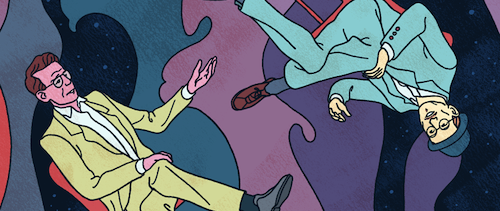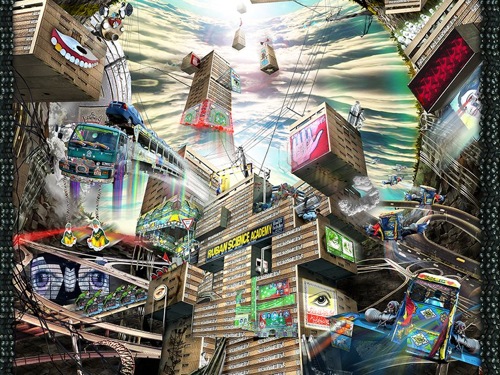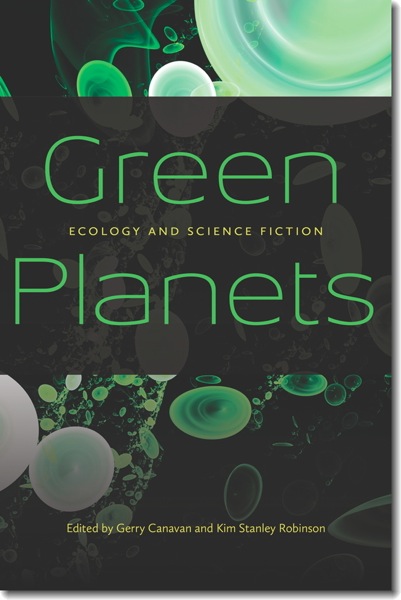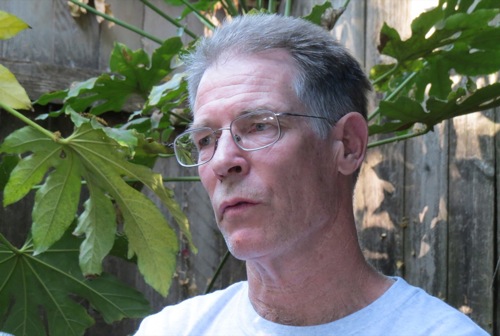KSR on Dos Passos, Asimov, Wolfe and more
Submitted by Kimon
While the Worldcon is on -- and there are various KSR happenings there, more later! -- here is some more material to get your teeth and brains on!
In the previous update I was mentioning "The Future Is Here" festival by the Smithsonian magazine. Along with everybody else's, KSR's talk is now online: "Humanity in the Solar System". Watch Stan guide you through the solar system, à la 2312!
In an interesting interview for Nautilus by astrobioligist David Grinspoon -- and some great KSR & 2312 illustrations by Kyle T. Webster! -- KSR goes over our main challenges as a civilization today and long-term alternatives that have been described in science fiction and in his 2312.
We need a global economic system that is designed specifically for sustainability. We already have a global economic system in the form of institutions like the World Bank and the International Monetary Fund. Together, their agreements make up a comprehensive system. But right now, this system cheats future generations by systematically underpricing the true costs of our exploitation of the biosphere. It sets the prices of the Earth’s natural resources by establishing what is basically the aggregation of supplies and demands. But this process is biased toward pricing things lower and lower, because of pressure from buyers and the need for sellers to stay in business. As a result, sellers sell their products for less than they cost to make, which should lead to bankruptcy for the seller, but it doesn’t because parts of the costs have been shifted onto future generations to pay. When practiced systematically it becomes a kind of multi-generational Ponzi scheme, and leads to the mass extinction event of the early Anthropocene, which we have already started.
[...] we have to alter the system we already have, because like an animal with evolutionary constraints, we can’t change everything and start from scratch. But what we could do is reconstruct regulations on the existing global economic system. For this, we would need to wrench capitalism so that the global rules of the World Bank, etc., required ecological sustainability as their main criterion. That way, prices would shift to match their true costs.
[...] In my novel, 2312, the economy is in some ways a funhouse mirror portrayal of our world. One of the civilizations—called the Mondragon after the Basque city in Spain that runs its economy as a set of nested co-ops—provides for everyone’s basic needs as a kind of public utility district service. Then there is a more free-market capitalist world of exchange of luxuries; these arrangements are loosely grouped as “above and beyonds.” That’s one image of a possible future, sustainable economy. However, if you include all the civilizations on Earth and in space in 2312, there remains a steep inequality gradient with most of the poor on Earth.
The format of 2312, with the different types of narration mixed in small chapters, comes from John Dos Passos' "USA Trilogy". Robinson talks about the novelty of Dos Passos' approach and how he managed to give a comprehensive view of 1920s-30s USA in a short interview for To The Best Of Our Knowledge.
KSR wrote an excellent article on Isaac Asimov's predictions for the future from the 1964 World Fair, so 50 years ago, a very interesting article that looks back at the science fiction of the time, the expectations for the future of a generation or two ago, how all that compares to today, and also interestingly what have been the successes of the predictions, the consistently reliable trends of our societies.
What did Asimov fail to see in the future? Many things, inevitably; but he did not miss the biggest problem that would be facing us in 2014, which is building a sustainable civilization. That is his article’s greatest achievement.
[...] he describes the Malthusian scenario of unchecked population growth resulting in a super-crowded “World Manhattan,” but he notes immediately that this scenario (which in his Foundation series was the city-planet Trantor) is ecologically impossible
[...] he writes, “there will, therefore, be a worldwide propaganda drive in favor of birth control by rational and humane methods,” and he predicts that by 2014 we will have “lowered the birth rate.”
To an extent these things have happened, and yet this is one of the great unsolved issues of our time. The human population is still rising at a rate of about 75 million people every year, and this is adding to the immense pressure we are putting on the Earth’s biosphere, our irreplaceable support system. So as Asimov pointed out, all is not rosy.
[...] He speaks of boredom as a result of this unemployment, because he is assuming that the postwar social security system will continue to give unemployed people economic support. He fails to imagine the breakdown of the postwar social contract, and a global economy where unemployment leads not just to boredom but to desperation and misery. He fails to imagine a society as brutal as we have become.
[...] Maybe that’s my prediction for the World’s Fair (“the world is fair”) of 2064. We’ll have different machines, we’ll have medical advances, a warmer and wilder climate, immense environmental stresses, more people (about 9.5 billion). Will we have universal women’s rights? Will we have full employment? We’d better! It’ll be that or catastophe.
Kim Stanley Robinson's introduction to "The Very Best of Gene Wolfe", titled "A Story" (a very 5HC-type title), is now online at the New York Review of Science Fiction. This can only be found in the rare "Very Best Of", not in the more widely available "Best Of", and is even a corrected/edited version of that "Very Best Of"! Some favourite extracts below:
A genius in Wolfe: and if there are any fellow postmodern materialists reading this and groaning at the idea of there being anything unusual inside an artist or anyone else, anything beyond the workings of the brain, I will agree immediately, but point out that the latest news from brain science makes it clearer and clearer that saying “only the brain” is not much of a delimiting statement. The brain is not a clockwork, nor a steam engine, nor a binary or digital computer, nor any of the machines we conceptualize it to be with our simple metaphors based on our own feeble handiwork, as if the brain could only be as complex as something we ourselves could make. Very much not the case. The brain is a kind of pocket universe. The mind is huge, and consciousness a small part of it. The unconscious may well be inhabited by “subroutines,” as the computer people would have it, processes that may actually be more like characters. Maybe they are like Jungian archetypes—a shadow seems likely, perhaps an anima or animus—but who knows. Very probably the brain consists of organizations even stranger and more various than that. It may be a kind of library of stories all telling themselves at once. And by way of stories written down, one unconscious mind communicates with other unconscious minds.
[...] I have been coming at Wolfe’s stories from a variety of angles here, like the magpies in my back yard banging on the black walnuts on the ground to break them open. The magpies are not getting very far, but it’s March, and they are persistent. With these stories, no matter what angle you take on them, no matter how hard you whack them, they stay whole and unexplained. I suppose that suggests we have come to the moment to try to speak about what these stories mean: but no. I decline. I’m not saying it’s impossible, but it would be hard. To do justice to that project would require some kind of ongoing Talmudic wiki that considered each story in turn, by itself and in relation to others. I have no doubt the Wolfeish community has already begun this discussion and will continue with it for ages to come. It is also true that sometimes the meaning of any given story is perfectly straightforward; in the later dialogues particularly, characters sometimes try to say things about life that are as plain and wise and interesting as you could want.
But more often it isn’t that simple. Wolfe’s meanings are complex. That’s part of his point, I take it: life is complex. There are values in life, these stories say, there is good and bad, and all kinds of other values, but they are not often simple to tease out or apply. Indeed it’s precisely where these matters are not simple that Wolfe is interested and finds his stories.
[...] I am proud to know him even a little, and speaking with full confidence for the science fiction community, which is like a small town scattered over the face of the earth and across time too, I’ll say: we are proud of Gene Wolfe. We have published him, we read him with joy, we celebrate him; we will always have reason to be proud of that. Gene shows that literature can be everything, a game, a mystery, a religion, a dive into the deepest depths. Read on and see what I mean and rejoice. Life means something.
In another short radio interview, KSR and an astrobiologist discuss Frank Herbert's "Dune" in the SciFri Book Club. Hear about the classic novel's ecological themes, the 1960s cultural revolution, the parallels to the oil industry, and more.
Finally, something not covered before: Robinson contributed to Jeff VanderMeer's "Wonderbook", "The Illustrated Guide to Creating Imaginative Fiction", a most amazing and creative endeavour mixing essays, visual aids and lots of humour in an unconventional publication for a writing companion! Head over to this table of contents and illustrations, this interview of VanderMeer and this fuller table of contents to marvel at it. Robinson's essay is between those of Nick Mamatas and Ursula K. LeGuin. An excerpt of Robinsons' essay can be found here:
“Thoughts on Exposition” by Kim Stanley Robinson
Am I advocating a return to the Encyclopedia Galactica? Yes. Its entries were always (at least potentially) bits of Stapledonian prose poetry, soaring like phoenixes out of their stories. Face it: sometimes the world is more interesting than we are. Even if the interest is always human interest.
So: “The door dilated”? That’s now the story’s title. We’ll jettison the long-forgotten plot (I bet it had danger and a chase) and focus on what always mattered: that door. We begin with the door’s manufacturing and installation instructions, badly translated from an unknown language. Next a Wikipedia article about it, apparently mangled in a fierce editing war that left certain ambiguities. Technical details about the door’s pupil mechanism (or, as it turns out, organism, for most are made from vat-grown squid siphons) are followed by a discussion of the door’s uses, maintenance problems, operating quirks, and notable breakdowns. We learn that dilating doors are installed where the air pressure on one side of the door is higher than on the other, but there is not the space to install a sliding door. An ordinary door between such pressure differentials either won’t open or opens much too fast, both dangerous; in fact, some people got killed by a conventional door opening too fast, including a person with the same last name as the dilating door’s inventor. But there have also been cases where dilating doors killed people, sometimes in malfunctions not explained in the accident investigations. Graphs and charts display information about these cases. What’s going on here? Will the reader have to evaluate the data in a forensic process, and imagine what happened? Yes. Because that’s how stories always work.
(Illustration on top by Kyle T. Webster)



